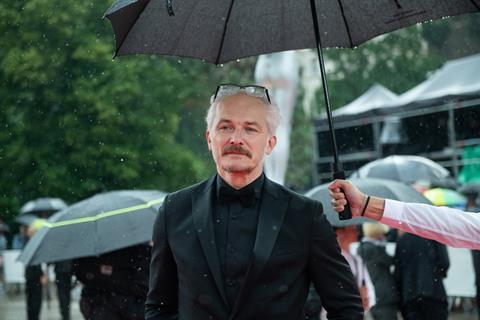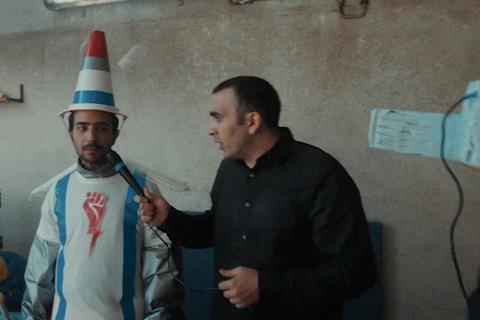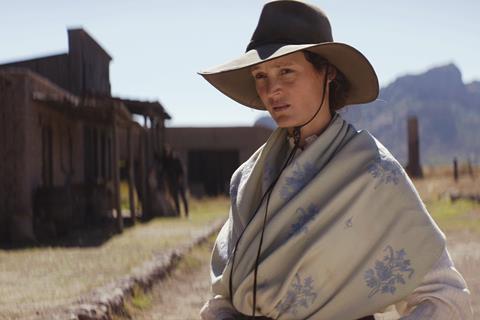
The programme of the 58th Karlovy Vary International Film Festival, which opens on Friday (June 28), is typically wide-ranging, befitting its reputation as a platform for both fresh discoveries and world cinema highights.
The Crystal Globe competition has the world premiere of UK director Mark Cousins’ A Sudden Glimpse To Deeper Things, a documentary portrait of UK painter Wilhelmina Barns-Graham. Also in competiton is Beata Parkanova’s Czech-Slovak title Tiny Lights which follows a family break up as perceived by a child. Parkanova won the best director award at Karlovy Vary in 2022 for Word.
Rising Norwegian writer director Lilja Ingolfsdottir’s Loveable is also in the running for a Crystal Globe. The drama is about a mother who must come to terms with herself when her husband asks for a divorce. Loveable won best Nordic project at the Finnish Film Affair 2023.
Meanwhile, Karlovy Vary’s Proxima competition, for works by young filmmakers and experienced auteurs, has Berlinale Forum regular Burak Çevik’s Nothing In Its Place, which focuses on one of Turkey’s most bloody political massacres.

Casting his eye over this year’s programme, artistic director Karel Och is naturally reluctant to pick out individual highlights from the 200 or so films playing. But when pressed, he alights on Noaz Deshe’s “very bold” German French co-production Xoftex, set in a Greek refugee camp where asylum seekers pass the time by making satirical sketches and preparations for a zombie horror flick.
Xoftex is difficult to define in terms of genre, he says. But it’s “one of those films which I always search for that, grab you by the shoulders and shakes you up - films which are strongly artistic, but at the same time, their story is deeply rooted in our contemporary reality”.
Och also picks out Karlovy Vary’s retrospective programme ’The Wish to Be a Red Indian: Kafka and Cinema’, featuring adaptations and films inspired by Franz Kafka to mark the 100th anniversary of the death of the acclaimed Prague-born writer.
Heading the retrospective are two films by Steven Soderbergh: his 1991 noir mystery Kafka, and 2021’s Mr. Kneff, his recut of the original film. It also includes Orson Welles’s The Trial (1962) as well as Martin Scorsese’s After Hours (1985). “It’s a vast, beautifully complex programme,” says Och.

He’s particularly excited Soderbergh, who he describes as “one of the undisputable masters of contemporary cinema”, is coming to the festival to introduce his films.
Other guests this year include Viggo Mortensen, Clive Owen and Daniel Brühl. Actor-director Mortensen’s second outing as a director, The Dead Don’t Hurt, plays as the opening film of this year’s festival.
Festival challenges
One of the big challenges facing Karlovy Vary is its position in the calendar between Cannes and Venice, making it tough to secure prestige arthouse titles. Even securing films that have already played at festivals is tricky. Och says he was disappointed not to be able to programme a number of Cannes premieres which have been held back for awards season campaigning.
He won’t say which films, but he reckons such movies “suffer when they are not shown to audiences” for four or five months before awards season campaigning starts in earnest.
Och has been a programmer with Karlovy Vary since 2001 and took over as artistic director in 2011. He says one of the highlights this year has been working with new members of the six-strong programming team. Vojtěch Kočárník and Petra Vočadlová have both joined, while Natalia Kozáková returned from maternity leave. The team is younger overall as a result.
“It doesn’t mean I haven’t enjoyed working with the previous team, but it was a challenge that I appreciated,” says Och. “Two of the new colleagues are 20 plus, and it was something which led to completely different types of conversations. Every now and then, to find a new definition of how to discuss films with your team, is very healthy, enlightening and challenging.”
Another challenge, of course, is how festivals like Karlovy Vary should respond to contentious political issues such as the Israel-Hamas war through to Russia’s full-scale invasion of Ukraine. The fallout from the Israel/Hamas conflict has spilt over into film festivals such as Berlin and the International Film Festival Amsterdam (IDFA) since the Hamas attacks on October 7.
Festivals are platforms for sharing and discussing opinions, Och says. “My opinion is that certain things should be allowed to happen so that people can have a conversation about them…a film festival is a platform, not a judgmental institution.”
However, Karlovy Vary “knows where it stands” on the invasion of Ukraine, clarifies Ochs, calling it a “very clear situation” – namely Russia’s aggression towards Ukraine. “And that goes for the Czech government, for the Czech people supporting their Ukrainian neighbours.
Och says the festival will have “a few moments that will support this” stance, including a special screening of Real from Ukrainian filmmaker and soldier Oleg Sentsov. “It is really like 90 minutes spent in the trenches of the battlefield. You could not get any closer to how a soldier feels, or a member of a country, which absurdly, is being attacked.” Och hopes Sentsov will be able to make it to the world premiere of the film.
Another contentious issue for festivals is AI. Earlier this month, Annecy Film Festival audience members booed the screening of French music video made using generative AI software. Peter Luisi’s The Last Screenwriter, written by ChatGPT, was banned this month from world premiering at London’s Prince Charles Cinema.
Discussion about the impact of AI is also important, says Och, who – somewhat counter-intuitively – says he “loves” that The Last Screenwriter was banned. “Not because I think it should be banned. It’s an extreme reaction to some something extreme going on. [It would be worse if] everybody accepted it without a discussion or without an extreme recreation….now we’re talking about it. That’s the only thing that can save us – that we can have a discussion about it.”
Karlovy Vary runs from June 28-July 6.















![[L-R]: Amanda Villavieja, Laia Casanovas, Yasmina Praderas](https://d1nslcd7m2225b.cloudfront.net/Pictures/274x183/6/4/1/1471641_pxl_20251224_103354743_618426_crop.jpg)








![[L-R]: Amanda Villavieja, Laia Casanovas, Yasmina Praderas](https://d1nslcd7m2225b.cloudfront.net/Pictures/100x67/6/4/1/1471641_pxl_20251224_103354743_618426_crop.jpg)
No comments yet